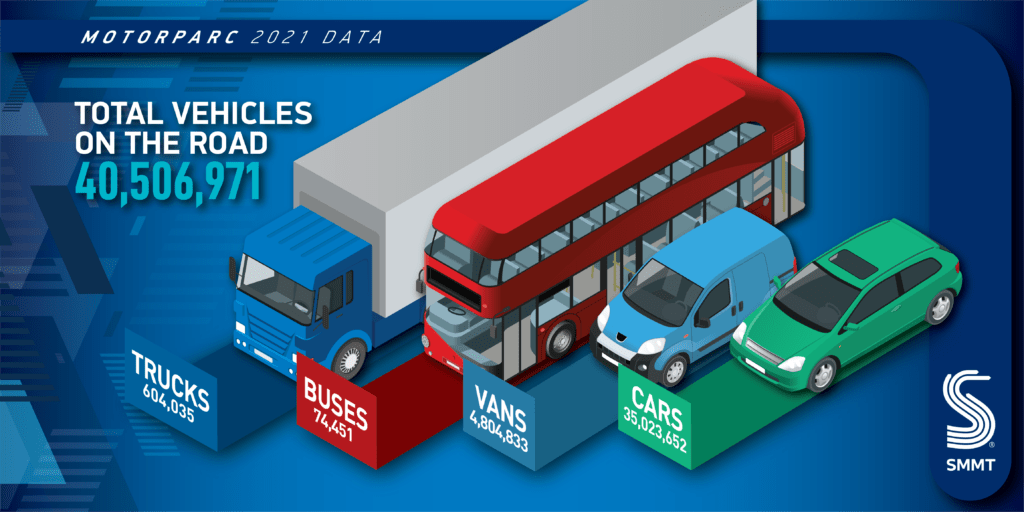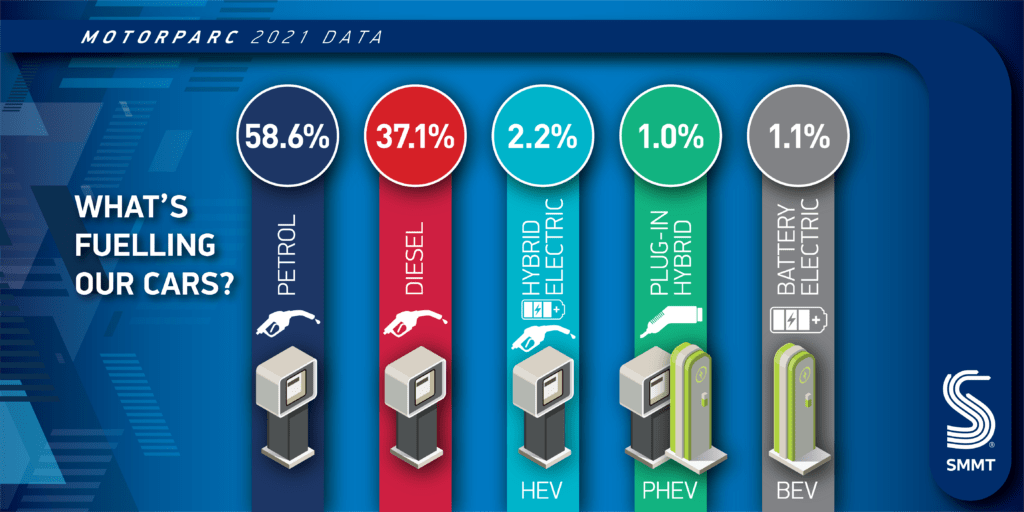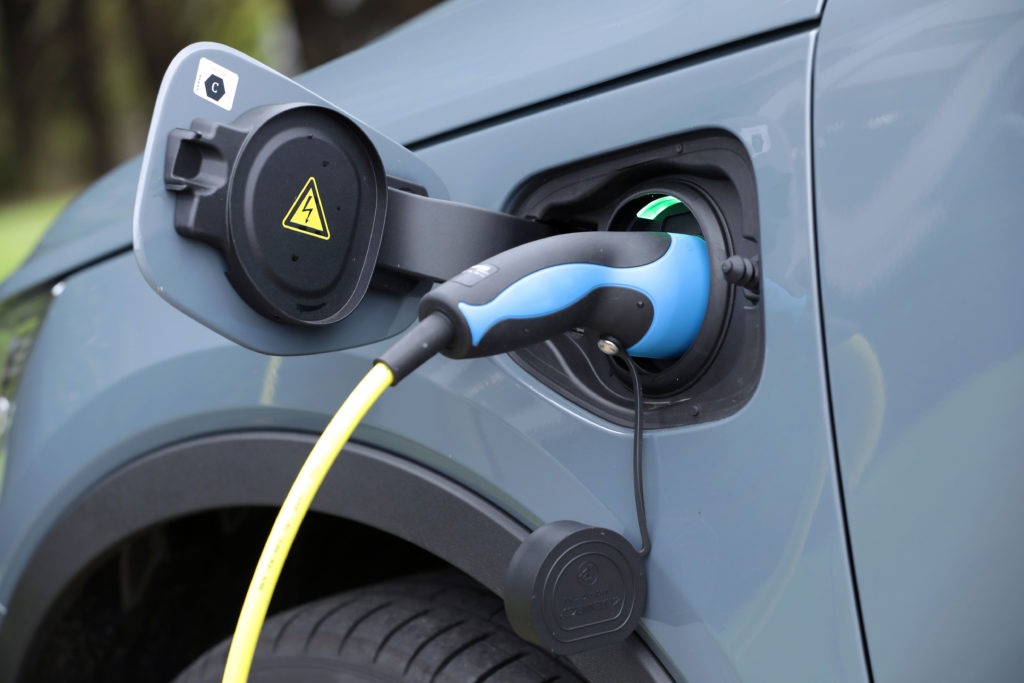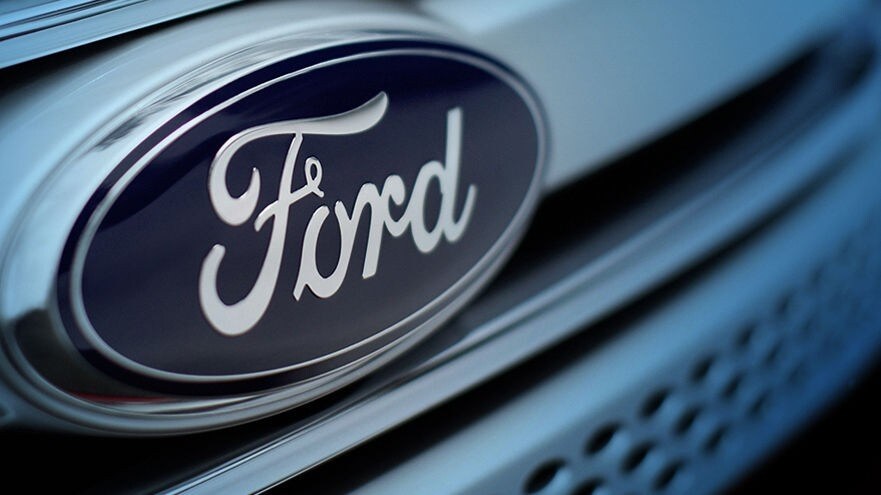UK sees car ownership decline again as EVs yet to take significant share
31 May 2022

The number of vehicles on the UK’s roads continues to grow. However, car ownership has declined in the country for the second consecutive year. This is the first time this has happened in more than a century.
In total, 40,506,971 vehicles were active in the UK during 2021, a slight increase of 0.4% on the previous year. Yet the country’s car parc fell 0.2% to 35,023,652 units. As the semiconductor crisis took hold throughout the year, impacting vehicle production, new-car registrations remained broadly static, at 1.65 million units.
However, the number of electric vehicles (EVs) on the roads remains relatively miniscule. This is despite a rapid increase in new battery-electric vehicle (BEV) and plug-in hybrid (PHEV) registrations, indicating the level of effort required to reduce CO2 emissions from transport in the country.
‘Britain’s switch to electric vehicles continues to gather pace, with a record one in five new-car registrations now plug-ins,’ commented SMMT chief executive Mike Hawes. ‘However, they still represent around one in 50 cars on the road, so there is significant ground to cover if we are to fully decarbonise road transport at pace.’
Car ownership in decline

The latest Motorparc Data, released by the Society of Motor Manufacturers and Traders (SMMT), shows car ownership in the country is in decline. Vehicles are more reliable, meaning there is less need to replace them. However, the change in commuting habits during COVID-19, together with the shortage in supply of new cars, has played a part. Many businesses now offer employees the opportunity to work from home, reducing the need for travel and therefore reducing the requirements for company cars.
Additionally, the lockdowns of the past two years closed dealerships, leaving consumers with less availability and more reasons to hold on to their current vehicles. This contributed to the average car age reaching a record high of 8.7 years, more than a year older than a decade ago. This means around 8.4 million cars in the UK are more than 13 years old, having been in service since 2008.
‘The first consecutive annual fall in vehicle numbers in more than a century shows how significantly the pandemic has impacted the industry, leading Britons to hold onto their cars for longer,’ said SMMT chief executive Mike Hawes. With fleet renewal essential to net-zero, we must build consumer confidence in the economy and, for drivers, confidence in the charging infrastructure to get the transition into top gear.’
Boost for light-commercial vehicle sector
Although the car parc has fallen, a good year for light-commercial vehicles (LCVs) helped the UK increase its overall vehicle parc. The sector has been one of the winners emerging from the pandemic, as consumer habits changed, and online retail transactions increased. This led to companies investing in new vans, growing the parc as a result. The number of LVCs on the road increased by 4.3% to 4,804,833.
The heavy-goods vehicle (HGV) sector, meanwhile, saw a 2.5% uplift, with 604,035 trucks making local, national, and international deliveries amid increased demand from key sectors. A decade of year-on-year decreases in the bus and coach parc ended with 1.1% growth last year to 74,451 units. However, this was at the second lowest level since records began in 1994, as lockdowns and pandemic-related changes in passenger behaviour saw reduced services and less demand from operators.
Electric-vehicle uptake still struggling
Although electric-vehicle (EV) ownership continued to grow rapidly in 2021, the numbers of models on UK roads are small compared to petrol and diesel vehicles, showing the effort required to increase the country’s electric parc.
‘Britain’s switch to electric vehicles continues to gather pace, with a record one in five new car registrations now plug-ins,’ commented Hawes. ‘However, they still represent around one in 50 cars on the road, so there is significant ground to cover if we are to fully decarbonise road transport at pace.’

Nearly three quarters of a million vehicles in the UK can be plugged in, including 720,053 cars, 26,990 vans, 993 buses and 313 trucks. This represents just 1.85% of the total vehicle parc. There are around 20.5 million petrol and 13 million diesel units in the car parc, making up 58.6% and 37.1% respectively, a combined total of 95.7%. Around 2.1% of cars are BEVs or PHEVs, with the remaining 2.2% made up of hybrids.
The majority of EVs are registered to businesses rather than people. Some 58.8% of all electric cars on the road are company registered. This reflects the broader, more generous incentives businesses get to make the switch compared to private consumers.
‘The first consecutive annual fall in vehicle numbers in more than a century shows how significantly the pandemic has impacted the industry, leading Britons to hold onto their cars for longer,’ added Hawes. ‘With fleet renewal essential to net-zero, we must build consumer confidence in the economy and, for drivers, confidence in the charging infrastructure to get the transition into top gear.’
In the commercial-vehicle sector, some 0.6% of vans are now EVs, indicating that the sector is around two years behind cars, despite both classes having the same end-of-sale date for new petrol and diesel registrations. Zero-emission public transport is picking up pace, with 1.3% of buses and coaches now battery-electric vehicles. Electric trucks account for less than 0.1% of the HGV parc, as the development of unique zero-emission technology for these vehicles continues.



